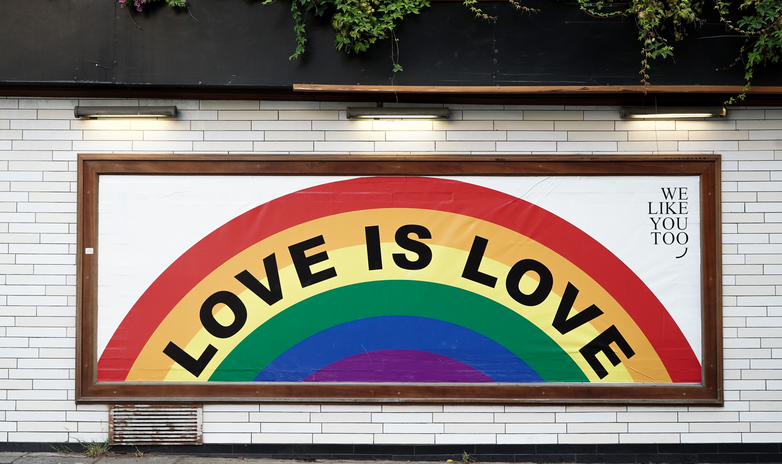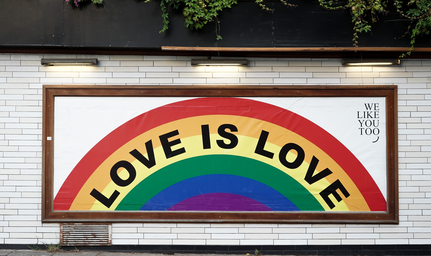When gay marriage was legalized in 2015, it seemed like the U.S. had taken a huge step forward in terms of LGBTQ rights and access, a step that couldn’t be taken back. Since then, however, the state of fair representation in the U.S. has drastically deteriorated, reminding us why we still need Pride to advocate for the community.
This year all official in-person Pride events have been canceled or postponed due to COVID-19. And though the European Pride Organizers Association and InterPride, a consortium of local organizations in the U.S. and internationally, are creating an online global event, it just won’t be the same. Crucially, it won’t drive the public awareness that Pride brings every year. With the current vulnerability surrounding LGBTQ people, this is a big blow, as we are in desperate need of a return to activism.
Here are some current areas where the political fight for fair social and economic systems is still very much ongoing.
Health Care
One of the most drastic political actions the Trump administration has taken is the change to Section 1557 of the Affordable Care Act, which barred health care discrimination based on race, color, national origin, sex, age or disability. In April, the Trump administration moved one step closer to removing protections for LGBTQ people, including circulating a final rewrite among the Department of Justice. By removing these protections, the administration is continuing its efforts to restrict the legal interpretations of discrimination. This is especially concerning considering the current COVID-19 public health crisis, and the fact that queer communities are more at risk.
According to the Center for American Progress, 8% of LGBQ respondents had experienced a doctor or other health care provider refusing to see them due to their actual or perceived sexual orientation—this number rose to 29% among transgender respondents. Coupled with other discriminatory acts like abusive language, unwanted physical contact, and intentional misgendering, 7% of LGBTQ people reported that they had avoided doctor’s offices in the past year.
As recently as 2015, the National Center for Transgender Equality found that 23% of transgender people had avoided seeking necessary health care because of fear of mistreatment. When public health is of a national concern, the administration should be working towards enabling more people to receive care, rather than facilitating further discrimination.
Employment
A 2017 survey by Harvard University found that at least one in five LGBTQ people had been personally discriminated against because of their sexuality and gender identity when applying for jobs and promotions. Too, nearly six in ten respondents agreed with the statement “LGBTQ people where I live have fewer employment opportunities, just because they are part of the LGBTQ community.” Fifty percent agreed that queer people in their area are paid less than non-queer people for equal work.
With only 20 states and the District of Columbia protecting against discrimination on the basis of both sexual orientation and gender identity (17 states have no protections at all on the state level) it’s clear that federal action is necessary to enact real change. Whether we get a positive decision or not, however, is dependent on a conservative Supreme Court.
This year, the Supreme Court is considering multiple cases that could have far-reaching consequences, particularly in regard to job discrimination. In the first, Zarda v. Altitude Express, a skydiving instructor claimed he was fired due to his sexual orientation. In Bostock v. Clayton County, a gay man argued that he was terminated from his job for his sexual orientation and participation in a gay recreational softball league. In EEOC v. R.F. & G.R. Harris Funeral Homes Inc., a transgender woman alleged she was fired after informing her boss that she intended to transition. Crucially, all of these cases could determine once and for all whether the Civil Rights Act of 1964 prohibits discrimination based on sexual orientation and gender identity. We can expect the decisions sometime before July.

Adoption and Foster Care
In April, the Department of Health and Human Services proposed a rule change that would abandon data collection on the sexual orientation of youth in foster care and of adoptive parents and guardians in the Adoption and Foster Care Analysis and Reporting System. This lack of data would impair advocacy organizations’ ability to work for LGBTQ policy and funding priorities, which, as the Human Rights Campaign Foundation notes, would lead to a cycle that “perpetually harms LGBTQ Americans and their families.” This latest change in regulations is just one of the federal government’s concerted efforts to roll back existing inclusive data collection since the start of Trump’s presidency in 2017.
There are also currently two lawsuits against the U.S. Department of Health and Human Services for allowing taxpayer money to fund foster care agencies that discriminate against queer parents. In Marouf v. Azar, a same-sex couple was denied the opportunity to apply to serve as foster parents for refugee children via an agency funded through the U.S. Conference of Catholic Bishops, because they did not “mirror the Holy Family.” The case is currently pending before the U.S. District Court. In Rogers v. United States Department of Health and Human Services, a same-sex couple in South Carolina was turned away by a government-funded foster care agency for failing to meet the agency’s religious criteria, which excludes same-sex couples of any faith.
This issue is not just a federal one. In January, Tennessee became the 11th state to pass a bill allowing religious groups to deny adoption and fostering to LGBTQ families, and a similar bill is under consideration in Georgia.
Issues of Identity
This year, there have been numerous political battles over issues of identity and transgender rights.
In Zzyym v. Pompeo, a federal discrimination lawsuit was filed against the U.S. Department on behalf of an intersex Navy veteran who was denied a U.S. passport because they could not accurately choose either male or female on the passport application (the form does not provide any other gender marker designation). In May, a federal appeals court ordered the State Department to reprocess the passport, overturning a 2018 decision that determined the State Department had overstepped its authority. Currently, only 11 states and Washington, D.C. grant identity documents with non-binary gender markers.
Regarding transgender rights in particular, during their 2020 legislative sessions over half of the U.S. states have introduced anti-transgender measures, from criminalizing medical professionals who prescribe hormone treatment to minors to requiring students use the bathroom belonging to their sex as listed on their birth certificate. While opponents have succeeded in halting or amending some of the bills, many others have been passed. Critically, many of the bills target transgender youth, who have reported significantly increased rates of depression, suicidality, and victimization compared to their cisgender peers — one in three transgender youth reported attempting suicide in the past year.
Another issue regarding transgender rights is that of the right to vote in the 2020 presidential election. Over 375,000 eligible U.S. voters who are transgender do not have identification that reflects their appearance or gender identity. With 35 U.S. states having some form of voter ID law, these voters may face barriers at the polls, including disenfranchisement.
Why Pride Makes a Difference
While many may think of Pride as being a purely festive occasion, it originated after the Stonewall Riots in 1969 where it was first and foremost a political event. In the crisis of COVID-19, this year might be the perfect opportunity for a return to activism, especially given the numerous decisions the Trump administration has made regarding equal rights.
One way to support LGBTQ activists is to support the organizations working to enact political change, many of which won’t get attention from Pride this year. Some organizations to consider include:
- Lambda Legal. This national organization is committed to achieving full recognition of the civil rights of LGBTQ people and everyone living with HIV. Much of their work involves bringing LGBTQ+ cases to court, including many of the cases listed above.
- The Trevor Project. Founded in 1998, this non-profit is committed to producing research and advocating for laws and policies that will reduce suicide among LGBTQ youth.
- Human Rights Campaign. The largest civil rights organization working to achieve equality for LGBTQ Americans, this non-profit has worked on political campaigns, non-discrimination legislation, and labor rights.
However you choose to celebrate Pride, remember that it holds more weight than just a day of revelry. While Pride may not be physically happening this year, we cannot allow the government to forget that the LGBTQ+ community exists.


